National Arab Orchestra and FSO Promote Harmony Through Music in “East Meets West”

Michael Ibrahim believes that “a tree is known by its fruit,” and as music director of the National Arab Orchestra (NAO), he is proud to bear fruit that is as sweet to share as it is to experience.
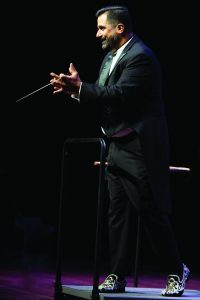
I have always wanted to share a piece of me,” says Ibrahim, who originally studied bassoon performance and music education at Eastern Michigan University. “And I love music. It always made me feel like I had something that I could give to others.”
Though he hasn’t always been enamored with the music of his culture, his heritage has always been deeply ingrained in his creative sensibilities. “When Arabs host events, they have this deep desire to share — share food, share company,” he says. “So it is part of the culture, and I do have a great culture so I want to share it. But it’s deeper than that for me,” Ibrahim says.
“Of course, sharing culture can build bridges and dispel fake narratives, but I really just want to share a piece of my life with everyone,” he admits, insisting that neither activism nor advocacy is his first priority. “I come from a better position of strength when I say, ‘I am’ rather than ‘I am not,’” he says, implying that he allows a rich cultural narrative to manifest organically in the music, rather than trying to intentionally combat bias.
“When you share what’s important to you, people partake. And when they partake, they get to know. And when they get to know, they start to understand. They understand my culture. And they understand me.”
Ibrahim and the NAO, which preserves the rich tradition of classical Arab music, will collaborate with the Flint Symphony Orchestra in September at FIM Capitol Theatre in a program titled “East Meets West.” The two ensembles have been collaborating at FIM since 2018, though this is only the second year they will perform at the Capitol Theatre.
And although Ibrahim may not consider himself an activist, the cultural implications of presenting Arab music — especially in conjunction with western classical music — are no less profound.
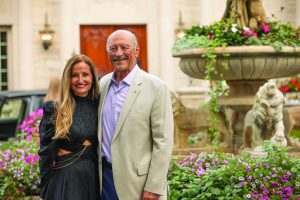
“We have been long-time supporters of both FIM and NAO, driven by our belief in uniting people through music, and connecting these two orchestras was a way for us to continue our work of bringing people together,” says Manal Saab, who, along with her husband Ghassan, has been a benefactor for the NAO/FSO collaboration since its inception.
When the Saabs first introduced FIM President Rodney Lontine to the NAO in 2017, they knew it was a crucial connection for both organizations. “We saw it as an opportunity to promote cultural exchange … through the universal language of music,” she says.
Lontine adds that he was eager to invest time and energy into the collaboration. “Through multi-cultural programming, FIM can offer people of different backgrounds, ages, races, cultures or socioeconomic status a safe space and common ground to share, understand, learn and appreciate each other through the joy of music,” he says. “Hopefully breaking down any preconceived notions or artificial boundaries in the process.”
Lucine Jarrah, Executive Director of the Arab American Heritage Council (AAHC) of Flint, makes it clear that, as the only Arab American organization in Flint and Genesee County, the AAHC does hope to advocate for their heritage by promoting the concert. “For the Arab American community, preserving culture through art and music is crucial because it maintains a link to our past, ensuring our traditions and stories are not forgotten,” says Jarrah.
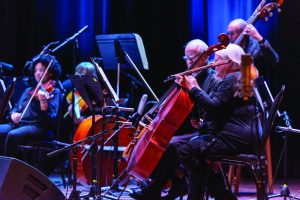
By partnering with FIM to maintain a presence at the NAO concert each year, the AAHC further reinforces their mission to preserve and celebrate Arab heritage through the intersection of art and activism, she says.
“This cultural visibility counters the erasure and misrepresentation that often accompany our lack of recognition in federal data. Through art and music, we ensure our voices are heard, our stories acknowledged, and our contributions celebrated.”
Ibrahim also attests to the invisibility of authentic Arab representation in the western classical repertoire. “Western orchestras often do not do their due diligence with Arab programming,” he says, noting that only a few pieces of classical music, like Rimsky-Korsakov’s Scheherazade, are earmarked for their Arab influences, but don’t capture the richness of the culture.
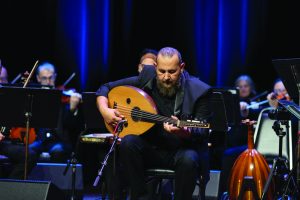
For the concert in September, Ibrahim intends to fill this gap by arranging his own fusions of western and Arab classical music. The Takht Ensemble of the NAO — comprised of traditional Arab instruments such as the oud, nay and qanun — will join an ensemble from the FSO to perform an eastern-influenced arrangement of Mozart’s 40th Symphony and a western opera sung in Arabic. The Takht Ensemble will also play several Arab pieces reimagined (by Ibrahim) for a western mindset.
According to Saab, this fusion of East and West will provide a unique opportunity for audiences of both the NAO and FSO. “They’ll have a chance to encounter Arab culture within a familiar setting, blending classical traditions from different parts of the world,” she says. “By merging musical styles, we seek to foster cultural appreciation, dialogue, and unity among diverse audiences.”
“Collaboration at its core is a partnership designed to produce a greater outcome together,” Lontine adds. “‘East Meets West’ is that commitment of combining and presenting our musicians, music and traditions together and separately to create a greater performance.”
For Saab, the importance of the cultural collaboration is perhaps most evident in its growth. Since its first free, standing-room-only performance at FIM MacArthur Recital Hall in 2018, the concert has expanded to fill the stage of the Capitol Theatre and attract several hundred more patrons.
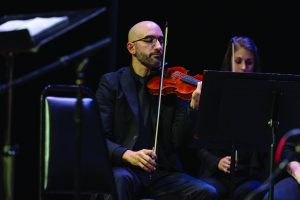
“The growing audience is a testament to the magic that happens when the NAO and FIM combine their talents,” says Saab. “It’s like witnessing a musical alchemy that enchants everyone present. The growth in audience size is not just about numbers; it reflects a shared enthusiasm for new musical horizons and the power of art to bring us together in a space of harmony and understanding.”